
- Homepage
- Brand
- Finish
- Maker
- Material
- Object Type
- Style
- Adams (7)
- Antique (3)
- Art Deco (1377)
- Art Déco (13)
- Art Nouveau (13)
- Cane (8)
- Cane, Walking Stick (4)
- Clutch (3)
- Contemporary (4)
- Evening Bag (4)
- French (4)
- Handle (4)
- Mid-century Modern (22)
- Modern (5)
- Oriental (19)
- Purse (33)
- Shoulder Bag (7)
- Tote (4)
- Vintage / Retro (3)
- Walking Stick (30)
- Other (821)
Antique HAEGER STANGLEVE Burgundy Double Handle Pottery Vase Art Deco Design
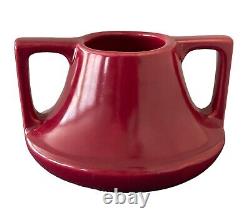
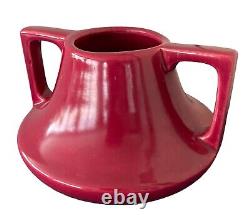
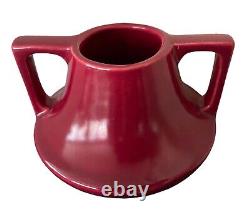
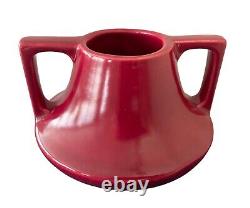
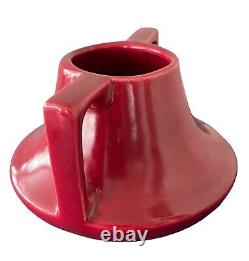
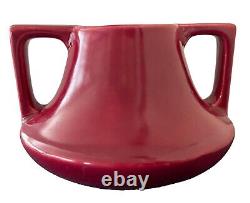
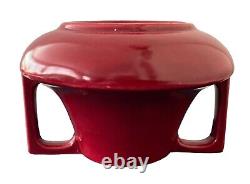
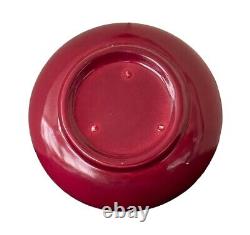
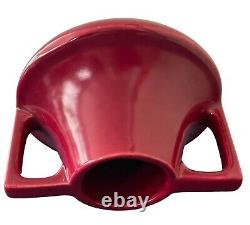
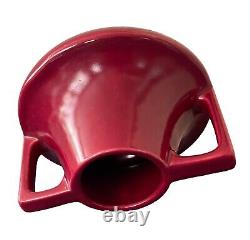
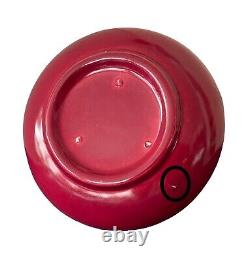


Antique HAEGER STANGL "EVE" DESIGN Burgundy Double Handle Pottery Vase circa 1918 A Stunning Art Deco Design with Deep Burgundy Color and Satiny Smooth Gloss Glaze Designed by Martin Stangl in his time of employment at Haeger between 1915 and 1920. A great addition to your arts and crafts movement collection!
In amazing antique condition with no chips, cracks or repairs. Please enlarge photos for a full visual description. This vase measures 5-5/8 inches across the top and 3-5/8 inches tall. About 30% - 40% of Haeger pottery is unmarked and can be identified by collectors with good knowledge of the shapes and glazes Haeger produced.Haeger glazed the bottom of its pieces and used stilts during the glazing, which left three small marks that are very noticeable on the bottom. These three marks are a reflection of the production process. The vase weighs 1 lb. About Haeger/Stangl Design: The first, most notable thing to know about Haeger pottery is the versatility of the potteries made by the company.
While other American Potters focused on producing mainstream potteries with sophisticated designs, Haeger pottery chose to design the mundane as sophisticated. Deciding to steer clear of utensils and dinnerware, Haeger produced decorative. Pottery that matched each trend. This led to their mass production of unconventional shapes of vases, lamp bases, planters, etc. Haeger's style drew i. Ts inspiration came from the trendy. Tyle and was designed with bold, eccentric colors, designs, and shapes.Added its Art Pottery line in 1914. The company had already been a successful producer of brick and tile in Dundee, Illinois for over 40 years before that date. Perhaps the person most responsible for Haeger's shift from brick and tile to artware was J. In 1914 Stangl joined Haeger to create its new Art Pottery line.
He came from the successful Fulper Pottery in New Jersey, a firm well-known for its beautiful flowing glazes and its strong, simple shapes. Stangl's early designs at Haeger also emphasized glazed form over decorative embellishments (such as underglaze hand decoration).Stangl's designs for the form drew on classical and Arts and Crafts shapes for the early ware. The first piece of Haeger. Was a classic Greek vase nicknamed "Adam, " and a companion vase, called "Eve" followed in 1915.
The piece here is the vase called Eve. The glazes used - particularly those in the early teens - strongly resemble those used by Fulper, and were in some cases identical. Haeger continued using Stangl's more popular shapes and glazes after he left to rejoin the Fulper pottery in about 1919.

